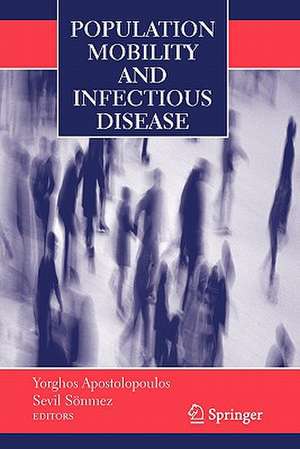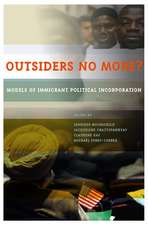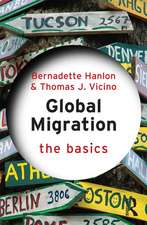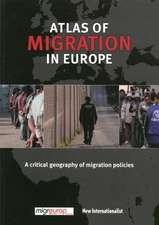Population Mobility and Infectious Disease
Editat de Yorghos Apostolopoulos, Sevil Sonmezen Limba Engleză Paperback – 4 noi 2010
The book argues that while biomedical events cause disease, social forces such as poverty and marginalization magnify them by giving them new opportunities to take hold. Population mobility—either voluntary or forced—brings contact between populations with different disease prevalence rates; outbreaks in turn are compounded by inequalities in access to medical care. From Katrina to Darfur, and from influenza to AIDS, an expert panel of health and social scientists bring the socioeconomic context of epidemics into clear focus: Historical perspectives on migration, development, and epidemics; Social resources and health barriers among migrant groups; The role of mobile labor populations (e.g., migrant workers, truckers, the military) in disease transmission; War, refugees, resettlement: health effects on the world scale; Natural disasters and climate change: their local and global disease impact; Leisure travel and health risks, from spring-break binges to commercial sex tourism; Methodological and design issues confronting researchers; The politics of prevention: ethical concerns in migration-related illness.
The unique scope of this book makes it as timely as the next health crisis and relevant to a gamut of interrelated fields, including public and international health, epidemiology, psychology, sociology, anthropology, human rights, and development and planning. By expanding concepts, examining trends, and pinpointing areas for intervention, it is a critical resource for the academic, research, practice, and policy sectors.
| Toate formatele și edițiile | Preț | Express |
|---|---|---|
| Paperback (1) | 371.30 lei 43-57 zile | |
| Springer Us – 4 noi 2010 | 371.30 lei 43-57 zile | |
| Hardback (1) | 378.43 lei 43-57 zile | |
| Springer Us – 15 mar 2007 | 378.43 lei 43-57 zile |
Preț: 371.30 lei
Preț vechi: 390.84 lei
-5% Nou
Puncte Express: 557
Preț estimativ în valută:
71.06€ • 73.99$ • 60.05£
71.06€ • 73.99$ • 60.05£
Carte tipărită la comandă
Livrare economică 10-24 martie
Preluare comenzi: 021 569.72.76
Specificații
ISBN-13: 9781441942944
ISBN-10: 1441942947
Pagini: 344
Ilustrații: XXIV, 320 p.
Dimensiuni: 155 x 235 x 18 mm
Greutate: 0.48 kg
Ediția:Softcover reprint of hardcover 1st ed. 2007
Editura: Springer Us
Colecția Springer
Locul publicării:New York, NY, United States
ISBN-10: 1441942947
Pagini: 344
Ilustrații: XXIV, 320 p.
Dimensiuni: 155 x 235 x 18 mm
Greutate: 0.48 kg
Ediția:Softcover reprint of hardcover 1st ed. 2007
Editura: Springer Us
Colecția Springer
Locul publicării:New York, NY, United States
Public țintă
ResearchCuprins
Demographic and Epidemiological Perspectives of Human Movement.- Demographic and Epidemiological Perspectives of Human Movement.- Key Themes Pertinent to Migration, Health, and Disease.- Population Mobility and the Geography of Microbial Threats.- Health Barriers and Inequities for Migrants.- Social Networks, Social Capital, and HIV Risks Among Migrants.- Labor Induced Migration and Disease Diffusion.- Economic Migrants and Health Vulnerability.- Military Personnel: On the Move and Vulnerable/AIDS to HIV and other STIs.- Selling Sex in the Era of AIDS: Mobile Sexworkers and STI/HIV Risks.- Tracing the Diffusion of Infectious Diseases in the Transport Sector.- Forced Migration: A Public Health Catastrophe.- War, Refugees, Migration, and Public Health: Do Infectious Diseases Matter?.- Natural Disasters, Climate Change, and the Health of Mobile Populations.- Leisure Migration and Health Concerns: A Paradox or Inevitability?.- Casual Sex in the Sun Makes the Holiday: Young Tourists' Perspectives.- In Search of the Exotic: Sex Tourism and Disease Risks.- Mapping and Modeling Disease Risk Among Mobile Populations.- Ethical and Legal Issues Impacting Migrant Health.- Migration in a Mobile World: Health, Population Mobility, and Emerging Disease.
Recenzii
From the foreword:
"At a point of history where the only constant is the endless and growing movement of populations, in both frequency and numbers, Population Mobility and Infectious Disease brings to the fore a long-overdue comprehensive work of prime value for students, researchers, and practitioners."
Janet Hatcher Roberts, Dr., Director, Migration Health Department, Geneva, Switzerland
"At a point of history where the only constant is the endless and growing movement of populations, in both frequency and numbers, Population Mobility and Infectious Disease brings to the fore a long-overdue comprehensive work of prime value for students, researchers, and practitioners."
Janet Hatcher Roberts, Dr., Director, Migration Health Department, Geneva, Switzerland
Notă biografică
Yorghos Apostolopoulos, Ph.D., is Associate Clinical Professor of Social Epidemiology, Emory University School of Medicine, Atlanta, Georgia, USA and Visiting Associate Professor of Medical Sociology, University of Athens School of Health Sciences, Athens, Attica, Greece.
Sevil Sonmez, Ph.D., is Assistant Professor of Medicine, Emory University School of Medicine, Atlanta, Georgia, USA and Associate Professor of Management, Cyprus College School of Business, Engomi, Nicosia, Cyprus.
Sevil Sonmez, Ph.D., is Assistant Professor of Medicine, Emory University School of Medicine, Atlanta, Georgia, USA and Associate Professor of Management, Cyprus College School of Business, Engomi, Nicosia, Cyprus.
Textul de pe ultima copertă
Population Mobility and Infectious Disease
Edited by
Yorghos Apostolopoulos, Emory University School of Medicine, USA
Sevil Sonmez, Cyprus College, Cyprus
Population Mobility and Infectious Disease moves beyond traditional behavioral and demographic theories of disease diffusion to focus on larger issues of social ecology and public health. With depth rarely seen in the international literature, it explores the complex and varied roles of mobile, transient, and displaced populations in the worldwide spread of airborne, waterborne, and sexually transmitted infections.
The book argues that while biomedical events cause disease, social forces such as poverty and marginalization magnify them by giving them new opportunities to take hold. Population mobility—either voluntary or forced—brings contact between populations with different disease prevalence rates; outbreaks in turn are compounded by inequalities in access to medical care. From Katrina to Darfur, and from influenza to AIDS, an expert panel of health and social scientists bring the socioeconomic context of epidemics into clear focus.
-Historical perspectives on migration, development, and epidemics
-Social resources and health barriers among migrant groups
-The role of mobile labor populations (e.g., migrant workers, truckers, the military) in disease transmission
-War, refugees, resettlement: health effects on the world scale
-Natural disasters and climate change: their local and global disease impact
-Leisure travel and health risks, from spring-break binges to commercial sex tourism
-Methodological and design issues confrontingresearchers
-The politics of prevention: ethical concerns in migration-related illness
The unique scope of this book makes it as timely as the next health crisis and relevant to a gamut of interrelated fields, including public and international health, epidemiology, psychology, sociology, anthropology, human rights, and development and planning. By expanding concepts, examining trends, and pinpointing areas for intervention, it is a critical resource for the academic, research, practice, and policy sectors.
Edited by
Yorghos Apostolopoulos, Emory University School of Medicine, USA
Sevil Sonmez, Cyprus College, Cyprus
Population Mobility and Infectious Disease moves beyond traditional behavioral and demographic theories of disease diffusion to focus on larger issues of social ecology and public health. With depth rarely seen in the international literature, it explores the complex and varied roles of mobile, transient, and displaced populations in the worldwide spread of airborne, waterborne, and sexually transmitted infections.
The book argues that while biomedical events cause disease, social forces such as poverty and marginalization magnify them by giving them new opportunities to take hold. Population mobility—either voluntary or forced—brings contact between populations with different disease prevalence rates; outbreaks in turn are compounded by inequalities in access to medical care. From Katrina to Darfur, and from influenza to AIDS, an expert panel of health and social scientists bring the socioeconomic context of epidemics into clear focus.
-Historical perspectives on migration, development, and epidemics
-Social resources and health barriers among migrant groups
-The role of mobile labor populations (e.g., migrant workers, truckers, the military) in disease transmission
-War, refugees, resettlement: health effects on the world scale
-Natural disasters and climate change: their local and global disease impact
-Leisure travel and health risks, from spring-break binges to commercial sex tourism
-Methodological and design issues confrontingresearchers
-The politics of prevention: ethical concerns in migration-related illness
The unique scope of this book makes it as timely as the next health crisis and relevant to a gamut of interrelated fields, including public and international health, epidemiology, psychology, sociology, anthropology, human rights, and development and planning. By expanding concepts, examining trends, and pinpointing areas for intervention, it is a critical resource for the academic, research, practice, and policy sectors.
Caracteristici
Compliments some of our upcoming books (i.e.: Evans Infections of Humans and Global Behavioral Risk Factor Surveillance) Benefits from cross-promotion with some of Springer's social medicine and sociology titles Includes supplementary material: sn.pub/extras













